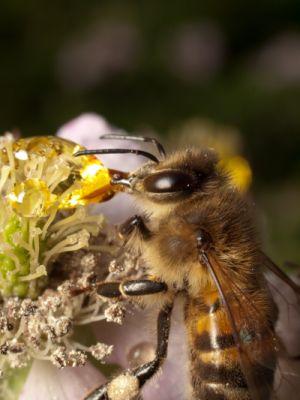Does imidacloprid have a negatvie effect on honeybee (Apis mellifera) behavior?

A widely used group of pesticides is the neonicotinoids and they are highly efficient towards the so called sucking pests. The pesticides act on the insects nicotinic acetylcholine recpetors, which are located in the insects central nervous system.
The pesticide is distributed all over the plant body, which means it will end up in both the pollen and nectar. When beneficial insects, such as honeybees and bumblebees, feed on the pollen and necter, which could contain pesticide, they will also be affected.
The pesticide used in this current study is called imidacloprid and belongs to this specific group of pesticides and its possible negative effect on honeybee behavior and olfactory learning were tested.
Responsible for this page:
Director of undergraduate studies Biology
Last updated:
05/17/11
